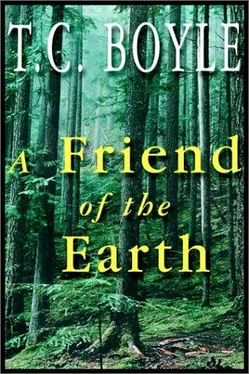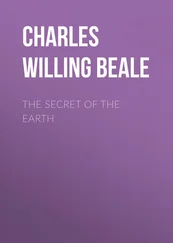He didn't say a word to anybody. Just waited till Andrea went off to work the phones at the E. E! Office half a mile up the street and Sierra was safely deposited at school, then rummaged through the garage for the watchcap and face paint, the crowbar, bolt-cutters and wrenches wrapped in black electrical tape to dull the kiss of metal on metal and the flashlight with the red nail polish smeared across the lens. And what were the terms of his parole? To remain within the city limits of Los Angeles, to report to his parole officer once a week, to protest nothing, demonstrate against nothing, abjure alltree-huggers and — spikers, and above all to steer clear of illegal activity of any kind. No extracurricular activities. No nightwork. No monkeywrenching. The judge made that abundantly clear.
Yes. Well, fuck the judge.
Black jeans, black T-shirt, black hiking boots: Tierwater looked like any other middle-aged Angeleno climbing aboard the RTD bus at the end of the block. He set the backpack-black and logoless-on the seat beside him and watched the mini-malls, restaurants, discount houses and tire shops scroll by the crusted windows till Budget Car presented itself amid a field of humped and gleaming automobiles. Inside, he was transformed into Tom Drinkwater, and though he knew it wouldn't wash if he was caught, he handed the man at the counter a Tom Drinkwater Visa card and showed him Tom Drinkwater's California driver's license, replete with a stunned-looking portrait of himself fixed in the lower left-hand corner.
There wasn't much on the radio all the long way up through the Central Valley-country or Mexican, take your pick — but somewhere around Stockton he picked up an oldies channel featuring the hypnotic noodling of Jerry Garcia, followed by an eternal raga of the sort Ravi Shankar used to inflict on audiences in the sixties. That was all right. The guitar climbed the stairs and came back down again, then climbed them, and came down, and climbed them, and the sitar jumped like a nervous bird from branch to branch of a spreading tree. He felt the music-he saw it — and it took him back to a time when he and Jane wore flowered shirts and pants so wide they were like flapping sails, a time when they subscribed to everything and never thought twice about it. Drugs were part of his life then. And protests. Political protests. Flag-burning. Jeering. Painting your face for the sheer hell of it.
There was none of that in what he was doing now What he was doing now-in this car, on this highway-was the prelude to an act of revenge. It was as simple as that, and he had no illusions about it. He drove with the calm that comes of purpose, sticking to the slow lane except to squeeze past the hurtling caravans of trucks, not daring to push the wheezing crackerbox of a rental car much more than ten miles over the limit: it wasn't worth the risk of getting pulled over. There was no point in having people see his face either, so he stopped only for gas, and when he got gas he picked up a chili-cheese dog or a microwave burrito and a Coke or a cup of coffee, one more anonymous traveler in a whole nation of them. He drove through the high-crowned afternoon and into the evening and the fall of day, and then it was the stars and the headlights until he crossed the Oregon border in a kind of trance in the unsteady light of dawn. His stomach was queasy-all that grease — and the caffeine had turned to sludge in his veins, so he steered his way off the interstate and down a series of increasingly small roads till he found a place where he could pull over and sleep beneath the trees.
It was past four in the afternoon when he woke. He thought of Andrea briefly, and of Sierra. They'd be worried, and in Andrea's case angry-he could hear her voice already, You idiot, you jackass, what are you, thinking? Enough, Ty. Enough already. Let it go. The voice was in his head, the argument as familiar as any litany, but he was unmoved. He drifted off into the woods, chewing the cold stub of a bean burrito and swilling from a plastic bottle of water. When he was finished with breakfast, he made his ablutions in a stream, relieved himself (properly, with every thought and care to contamination and the stream's drainage), and spent the rest of the daylight hours in a bed of pine boughs, watching the sky.
For long stretches, he thought nothing, but then he was thinking of Chris Mattingly, and the article he'd written about the Tierwaters' venture into aboriginal life. It had made the cover of Outside magazine, and it put them on the map, that was for sure. After that, practically every publication in the country, from People to the New York Times to the Enquirer, wanted to know what he and Andrea thought about the rain forest, the holes in the ozone layer, the decline of frogs worldwide, what it felt like to live naked and make love in a hut. The article had run to twelve pages, with photos, and each line added another layer to the myth till the canonization was complete: they were the saints of the Movement, and forget the Fox, forget Abbey and Leopold and Brower and all the rest. Tierwater must have read it twenty times, lingering over the photos as he lay in his bunk in prison, remembering the texture of the rock, the smell of the night air and the taste of water fed on alpine snow. And the cover photo-he could see it now-of him and Andrea from the waist up, their faces reddened and smudged, the sun-bleached ends of her hair blowing across her face, both of them healthy still and sleek, looking like naked rock stars on the cover of Rolling Stone. It was a charge. But what, he wondered, would Chris Mattingly think of this, of what was going to come down tonight? Would that be a saintly thing? Would that be worthy of the cover?
He drifted off, and then darkness came, attached to a fine drizzle, and he sat in the car to get out of the wet, listening to the radio and letting his mind go numb. It was too early yet to get down to business-he'd wait till twelve at least, maybe later. He tried to sleep-it was going to be a long night, and a longer day, because he was driving straight through the minute he was done, and he would be sitting right there in the living room in front of the TV when Jimmy Chavez, his parole officer, came round to ask him if he'd heard anything about what had gone down in Oregon last night.
At quarter past twelve, he put the car in gear and followed a snaking series of back roads to Grants Pass. It was nothing to find addresses for Judge Harold P. Duermer and Sheriff Robert R. Hicks — they were both listed in the phone book — and he already knew where the police station was. He drove by the judge's house twice, then parked round the corner, on a street so dark it was like the inside of a cave. The drizzle had turned to a persistent shower by this time, and when he came up the judge's long macadam drive, it shone like a dark river in the light of the gas lamp over the garage door. There was no sound at all, but for the hum of a transformer on the telephone pole overhead: no crickets, no frogs, not the hoot of an owl or the soft shoosh of a passing car. Tierwater stuck to the shadows and reconnoitered.
The judge lived well, in a big colonial-style place that stood on the crest of a hill, surrounded by lawns and flowerbeds, and with a swimming pool and clay tennis court out back, and Tierwater didn't begrudge him that. The man was a tool of the machine-why wouldn't he live well? All he had to do was toss a bunch of protestors in the slammer, break up families and terrorize little girls, and somehow, with the good grace of the timber company, convert all that ponderous legal activity into something tangible, the yacht in the harbor, the white Mercedes 500SL, the condo in Aspen and a good month here and there in Cancim or Saint-Moritz, maybe a shopping spree in the Big Apple for Mrs. Justice Duermer herself.
Читать дальше












